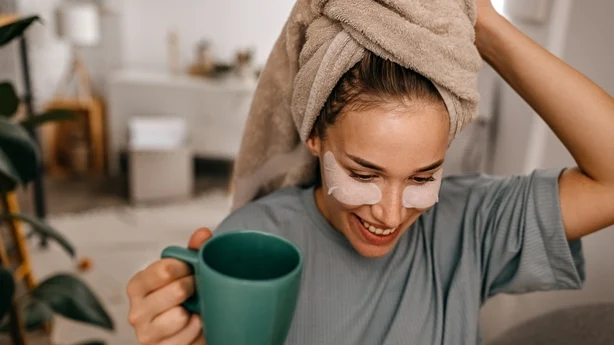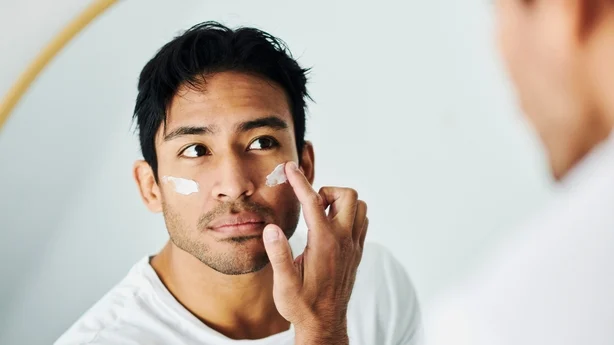It’s always trickier to wake up and feel rested during winter mornings. The shorter days and early rises mean our skin isn’t able to naturally adjust to sunlight – leaving our eyes still looking half asleep by lunch time.
Stress can also worsen under-eye bags – with disrupted sleep cycles and bouts of crying contributing to swollen eyes.
If you’re looking to dial back under-eye puffiness and redness in the morning, dermatologists and skincare experts reveal the ultimate rescue plan for the season – and no, cucumber slices don’t cut it.
Why do we get puffy eyes?
Puffy eyes are driven by the anatomy of our face and how it changes with age. "The eyeball is in a bony socket called the orbit, which is cushioned in fat," explains dermatologist and co-founder of London’s Ardour Clinic, Dr Paris Acharya.
"The fat is held back and supported by a structure known as the orbital septum, which is paper thin. Unfortunately, over time, the septum weakens and the orbital fat protrudes forward causing eye bags and puffiness."
Puffy eyes can also be caused by allergies, smoking, dehydration and lack of sleep, as this triggers a build-up of fluid around the eyes. "The accumulation of fluid in the under-eye area can also occur as lymphatic drainage slowly decreases, this is part of the ageing process as the skin’s elasticity reduces," explains says skincare specialist and dermatologist, Dr Leah Totton.

How to treat puffy eyes
The skin around the eyes is the thinnest on our face. "It also holds lymph (excess fluid from our cells) in the most delicate web-like vessels that can easily be damaged," explains holistic wellness and skin specialist, Marie Reynolds.
Because of this, our ordinary face moisturiser isn’t designed for that area. "It’s not just about the correct ingredients to work their magic around your eyes," says beauty therapist and co-founder of Katherine Daniels, Donna Tait, "It’s about the product’s molecular weight. Heavy face creams and oils may make your eyes more puffy than usual."
Therefore, it’s important to use active eye creams in the morning to rejuvenate the blood vessels. "Products containing caffeine can help to de-puff the eye area," says regenerative doctor, Dr Miriam Adebibe, "It works to revive and brighten the delicate skin around the eyes for a noticeably luminous appearance.
"Not only a pick-me-up come morning, caffeine works wonders due to its vasoconstrictive properties, meaning it reduces swelling and prevents fluid from stagnating around the eyes. It also contains anti-inflammatory properties," Aebibe explains.
Alongside caffeine, ingredients such as hyaluronic acid, peptides, vitamin K, and retinol can improve hydration, encourage circulation and help tighten the skin giving an instant de-puffing effect.
Cold compresses also work to de-puff eyes if you’re in a time crunch. "Ice globes serve to minimise inflammation and puffiness," says Optase Life’s oculoplastic surgeon, Dr Elizabeth Hawkes. "They improve sinus pressure, reduce redness and kickstart the circulation to give a radiant glow to the skin – not unlike a cold shower for the face!
"But these should be used sparingly," Dr Hawkes advises, "for no more than five minutes each morning, to avoid any damage from over-exposure to a cold surface."
How to conceal puffy eyes
Although it may be tempting to cover your under-eyes with thick concealer, if you wear face make-up, Reynolds advises you to keep it sheer and simple. "Do not cake the eyes with heavy concealers, instead use formulas that are reflective and lightweight, remembering to pat into the skin lightly."
When applying make-up, Reynolds emphasises to not drag the skin, "apply hardly any pressure at all and this will encourage lymph to drain. If you drag the area, it can actually cause more harm than good."
Make-up can also be a catalyst for your puffy eyes, as residual make-up – particularly mascara and eyeliner – can clog delicate pores around the eyes, leading to inflammation.
"The heavy-handed wiping movement that is present when using, say, a make-up wipe can be too tough on the eye skin, which can actually cause long-term damage, puffiness, and early lines and wrinkling," says Acharya, who instead recommends using a gentle cleanser or oil-based balm to remove eye make-up.

How to prevent puffy eyes
Thankfully, Acharya reveals that in most cases it is possible to prevent puffy eyes, and it mainly comes down to sleep and hydration. "Make sure to get plenty of sleep – around seven to nine hours for most adults – as this will help to de-puff the eye area in the morning.
"I also recommend propping yourself up slightly when you sleep; sleep with a few pillows under your head to avoid fluid settling around your eyes," she explains.
Yet preventing puffiness goes beyond skincare. "Prevention is often linked with lifestyle habits," says Tait, "avoiding salty meals and alcohol before bed can reduce water retention, as both contribute to edema (swelling due to water retention).
"Also, consider that as you age, your skin loses oil and elasticity, making lifestyle choices even more impactful on how your eye area appears each morning," says Tait.
For those wanting a more permanent solution, they can opt for in-salon treatments, "For those who wish to seek non-surgical cosmetic intervention, treatments available include polynucleotides and ClearLift Laser," says Totton. These treatments encourage collagen production to decrease saggy skin and fine lines.



